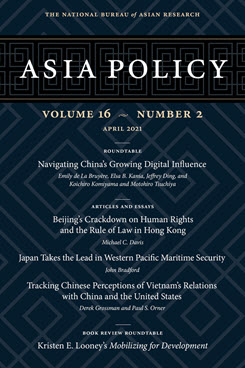The Triadic Conflict That Lies Ahead in the U.S.-China Tech Confrontation
This essay examines how the triadic conflict between the U.S., China, and technology companies is shaping the governance of cyberspace.
EXECUTIVE SUMMARY
MAIN ARGUMENT
With the increasing influence of global technology companies, a trilateral competition is emerging between the U.S., China, and these companies over supremacy in cyberspace. As common values are a prerequisite for cyberspace governance, each actor is advocating values that favor its position. The U.S. and other democracies argue that cyberspace must continue to be democratic, whereas China and other authoritarian states argue that state sovereignty is the highest guiding principle. The tech companies, on the other hand, want to ensure that cyberspace remains global. Sovereignty, globalization, and democratic governance thus constitute a trilemma between positions that are partly incompatible with each other.
POLICY IMPLICATIONS
- With nations and tech companies on a collision course, the U.S. and Japanese governments should not confront two competitors at the same time. Instead, to push back against authoritarian regimes on cyberspace governance, democratic countries need to cooperate with tech companies.
- Confronted with the trilemma between democracy, sovereignty, and globalization, policymakers can advance up to two of these values. However, advancing all three is not a viable option because of incompatibilities between these values in practice.
- The triadic conflict in cyberspace can also be seen as a competition for access to data. As the U.S., China, and technology companies drive data into their own jurisdictions, difficult times lie ahead for other actors, such as developing countries, international organizations, regional security organizations, civil society, and standardization bodies.
Koichiro Komiyama is a Guest Researcher at the Keio University Global Research Institute (Japan). His areas of focus are cybersecurity governance, incident response, and ICT capacity building. He is also the Director of the Global Coordination Division at the Japan Computer Emergency Response Team, where he engages in international cyber incident responses.
Motohiro Tsuchiya is the Dean of the Faculty of Policy Management and a Professor in the Graduate School of Media and Governance at Keio University (Japan). His areas of interests are the impact of the information revolution on international relations, global governance and information technologies, and cybersecurity.
About Asia Policy
Asia Policy is a peer-reviewed scholarly journal presenting policy-relevant academic research on the Asia-Pacific that draws clear and concise conclusions useful to today’s policymakers. Asia Policy is published quarterly in January, April, July, and October and accepts submissions on a rolling basis. Learn more


